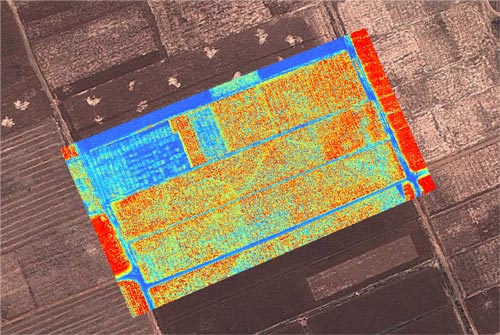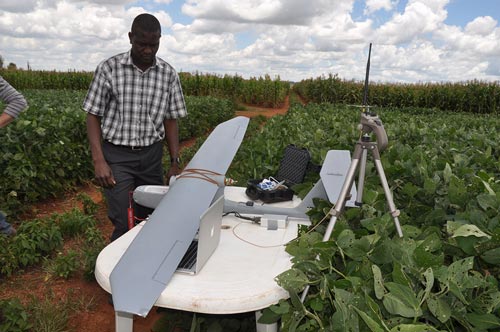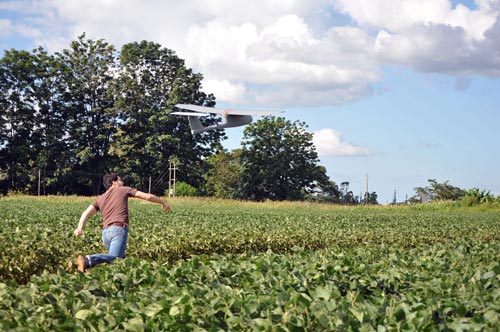 To free phenotyping of the varietal development bottleneck label, many new tools have been developed to enable an easier plant growth and development characterization and field variability. Until recently, these tools’ potential has been limited by the scale on which they can be used, but this is changing: a new affordable field-based phenotyping platform combining cutting edge aeronautics technology and image analysis was developed through collaboration between researchers from the University of Barcelona, Spain; Crop Breeding Institute, Zimbabwe; Instituto Nacional de Innovación Agraria, Peru; AirElectronics; and Sustainable Agricultural Institute of the High Research Council, Spain. The project was funded by MAIZE CRP as part of Strategic Initiative 9 activities focusing on new tools and methods for national agricultural research systems and small and medium enterprises to increase genetic gains in maize breeding.
To free phenotyping of the varietal development bottleneck label, many new tools have been developed to enable an easier plant growth and development characterization and field variability. Until recently, these tools’ potential has been limited by the scale on which they can be used, but this is changing: a new affordable field-based phenotyping platform combining cutting edge aeronautics technology and image analysis was developed through collaboration between researchers from the University of Barcelona, Spain; Crop Breeding Institute, Zimbabwe; Instituto Nacional de Innovación Agraria, Peru; AirElectronics; and Sustainable Agricultural Institute of the High Research Council, Spain. The project was funded by MAIZE CRP as part of Strategic Initiative 9 activities focusing on new tools and methods for national agricultural research systems and small and medium enterprises to increase genetic gains in maize breeding.
 The new platform uses ‘Sky Walker,’ an unmanned aerial vehicle which can fly at over 600-meter with an average speed of 45 km/h. The vehicle has thermal and spectral cameras mounted under each wing, and its flight path and image capturing are controlled via a laptop using Google Earth images. Jill Cairns and Mainassara Zaman-Allah tested the platform at CIMMYT-Harare along with José Luis Araus (University of Barcelona), Antón Fernández (AirElectronics president), and Alberto Hornero (Sustainable Agricultural Institute of the High Research Council) to establish the optimal flight path (distance between plane passes and height) for plot level measurements. Field experiments were phenotyped for spectral reflectance and canopy temperature within minutes; these will be compared to results from the GreenSeeker.
The new platform uses ‘Sky Walker,’ an unmanned aerial vehicle which can fly at over 600-meter with an average speed of 45 km/h. The vehicle has thermal and spectral cameras mounted under each wing, and its flight path and image capturing are controlled via a laptop using Google Earth images. Jill Cairns and Mainassara Zaman-Allah tested the platform at CIMMYT-Harare along with José Luis Araus (University of Barcelona), Antón Fernández (AirElectronics president), and Alberto Hornero (Sustainable Agricultural Institute of the High Research Council) to establish the optimal flight path (distance between plane passes and height) for plot level measurements. Field experiments were phenotyped for spectral reflectance and canopy temperature within minutes; these will be compared to results from the GreenSeeker.
The measurement speed of the new platform helps to overcome problems associated with changes in cloud cover and the sun position. It will be used by the Crop Breeding Institute to assist in developing new maize hybrids with heat stress and drought stress tolerance under elevated temperatures.

 Climate adaptation and mitigation
Climate adaptation and mitigation 
